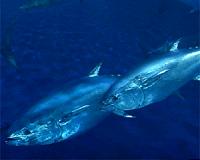| . |  |
. |
Washington (AFP) Aug 2, 2010 A census of sea life in the Gulf of Mexico completed last year found it to be one of the most biodiverse bodies of water on the planet, a report published Monday as part of a massive inventory of marine life around the world shows. But months after the census was completed, the scientists from Cuba, Mexico and the United States who worked on it could only watch, along with the rest of the world, as the biggest oil spill in US history unfolded in the sea after an explosion on the BP-leased Deepwater Horizon rig. The roll call of sea life that scientists thought would be a tribute to the Gulf's biodiversity was now looking to be little more than a baseline to be used in future to show the damage done by the spill. "The oil spill was a shock. The only good thing about it is that we have a baseline and we'll be able to assess the damage and monitor the changes that happen with the oil spill," said Patricia Miloslavich of Universidad Simon Bolivar in Venezuela, a senior scientist who worked on the Gulf census. "We are very sad about the spill but we are happy that there is a good description of life in the region before the spill," Jesse Ausubel, co-founder of the Census of Marine Life program, which Monday published a preliminary inventory of the world's sea life and several accompanying reports, told AFP. The inventory of marine life in the Gulf of Mexico was "the first authoritative listing and description of life" in the sea, including the spot around 50 miles off the coast of Louisiana where oil has been spewing since late April from a ruptured wellbore on the sunken Deepwater Horizon rig. The scientists found more than 15,000 marine species in the Gulf, including 8,332 forms of marine life "that live right where the oil spill occurred in April," said Ausubel. Even before the spill, the Gulf was one of the most at-risk regions from over-fishing, habitat loss and pollution, the Census of Marine Life found. The millions of gallons of crude oil that have spilled into the Gulf since April have expanded the dangers facing sea life, especially for species that spawn in the Gulf. "It's a breeding ground, a meeting area for blue fin tuna," said Ausubel. "Blue fin tuna spawn in the Gulf in March and April ... in an area quite close to where the spill occurred. "One of the concerns of the census scientists is that the fish eggs might become coated with oil and then have difficulty obtaining the necessary oxygen to grow," he said. The Gulf of Mexico houses predominantly oyster reefs and salt marshes in the warm-temperate waters of the north and the tropical waters in the south. The western Gulf houses one of only five hypersaline lagoons in the world, the Laguna Madre of Texas and Tamaulipas. Coral reefs are common offshore, in the Florida Keys, in Cuba and off the Mexican state of Veracruz and Campeche. As with the rest of the world's seas, the most common species in the Gulf are crustaceans, such as crabs and lobsters, followed by mollusks -- which includes octopi and squid, and fish.
Share This Article With Planet Earth
Related Links Water News - Science, Technology and Politics
 WWF urges Japanese to stop eating endangered bluefin tuna
WWF urges Japanese to stop eating endangered bluefin tunaTokyo (AFP) Aug 2, 2010 Japanese people, who consume most of the Atlantic and Mediterranean bluefin tuna catch, should avoid eating the species until its harvest becomes sustainable, the World Wide Fund for Nature (WWF) said Monday. Japan consumes three-quarters of all bluefin, mainly raw as sushi and sashimi, but experts agree that decades of overfishing have seen its stocks crash by more than two-thirds in the Me ... read more |
|
| The content herein, unless otherwise known to be public domain, are Copyright 1995-2010 - SpaceDaily. AFP and UPI Wire Stories are copyright Agence France-Presse and United Press International. ESA Portal Reports are copyright European Space Agency. All NASA sourced material is public domain. Additional copyrights may apply in whole or part to other bona fide parties. Advertising does not imply endorsement,agreement or approval of any opinions, statements or information provided by SpaceDaily on any Web page published or hosted by SpaceDaily. Privacy Statement |